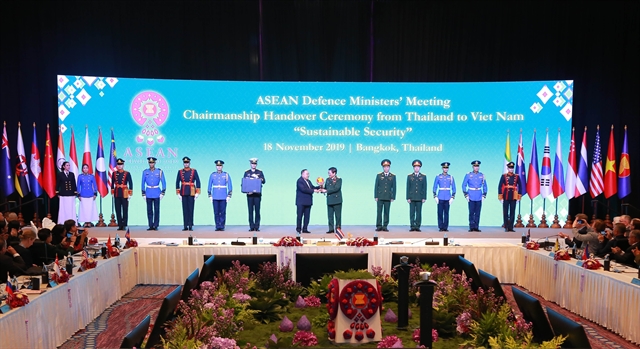
|
| The Vietnamese Ministry of National Defence has officially assumed the role of Chair of ASEAN Defence Ministers’ Meeting (ADMM) and ADMM Plus for 2020 at a ceremony held in Bangkok yesterday. Politburo member, Vice Secretary of the Central Military Commission and Defence Minister General Ngô Xuân Lịch received the token of the Chair of ADMM and ADMM Plus from Thai Deputy Prime Minister Gen. Prawit Wongsuwan. — VNA/VNS Photo Ngọc Quang-Hữu Kiên |
BANGKOK — Defence Minister Ngô Xuân Lịch addressed an ASEAN ministers’ meeting with partners yesterday, describing trust as the most important factor for countries to work together in dealing with security challenges in the region.
He delivered a speech at the 6th ASEAN Defence Ministers’ Meeting Plus, themed 'Sustainable Security', in Bangkok on Monday.
The event drew defence officials of the 10 ASEAN countries and the dialogue partners of Australia, China, India, Japan, the Republic of Korea, New Zealand, Russia and the US.
Lịch said peace, co-operation and development are still the main trends, in which regional security co-operation mechanisms led by ASEAN have proved increasingly effective, helping maintain a peaceful and stable environment for growth and development.
Sharing other officials’ concerns about recent regional and global situations, he said security challenges in the region are growing, from climate change, piracy and cybersecurity to disputes and disagreements on sovereignty and territory.
Lịch called on countries in the region to uphold the responsibility and together deal with differences and prevent issues from becoming conflicts. He also underlined the need to adhere to international law; bring into play community responsibilities, and promote existing bilateral and multilateral co-operation mechanisms.
According to the Vietnamese minister, for regional countries, big or small, to co-operate substantively and sincerely in solving security challenges in the region, trust is vitally important.
The building and consolidation of trust require time and patience, and trust must be strengthened regularly on the basis of concrete principles and actions, Lịch said, adding that the trust building process needs consistency between words and actions, transparency in policy making and implementation, and the harmonisation of each country’s interests with those of other countries and the region.
All actions must be in line with principles enshrined in the United Nations Charter, international law and regional commitments, he noted.
The minister said recent tensions in the East Sea show that once international law is not respected, security and stability are jeopardised.
Peace in the East Sea not only benefits the parties directly concerned but also the region and the world. The settlement of the East Sea issue in a peaceful manner, in a partnership spirit and for community responsibility, is the foundation to turn it into a water body of peace, co-operation and development, he added.
Lịch also reiterated Việt Nam’s consistent policy of solving the East Sea issue by peaceful means on the basis of international law, and that parties must respect one another’s legitimate and legal interests stipulated in the 1982 UN Convention on the Law of the Sea (UNCLOS) and avoid actions that may complicate the situation or elevate tensions.
Việt Nam has been working with other ASEAN members and China to build a substantive and effective Code of Conduct (COC) in the East Sea, he noted.
At the meeting, participants discussed traditional and non-traditional security challenges like terrorism, the reverse effect of technological development, and cybersecurity.
They also had in-depth discussions on maritime challenges, including those relevant to the East Sea, and affirmed the importance of maintaining peace and stability in the waters to regional and global security.
Many ministers stressed the need to respect international law, including the 1982 UNCLOS, and expressed the hope to soon finalise an effective and substantive COC. — VNS
 Politics & Law
Politics & Law






